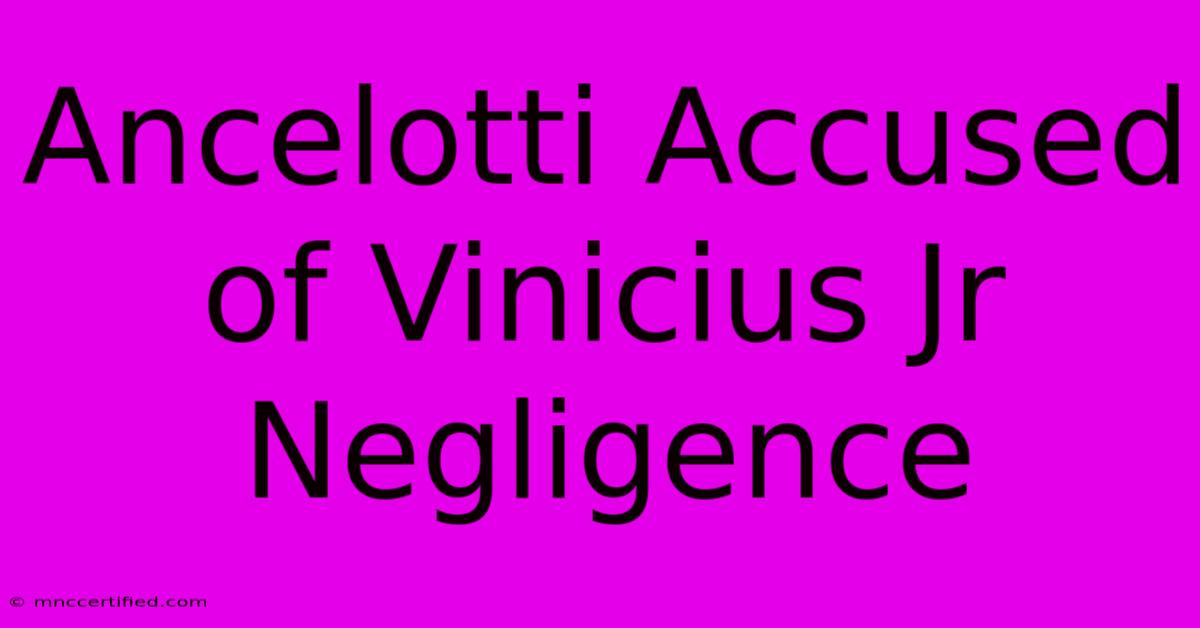Ancelotti Accused Of Vinicius Jr Negligence

Table of Contents
Ancelotti Accused of Vinicius Jr Negligence: A Controversial Claim Under Scrutiny
The recent accusations leveled against Real Madrid manager Carlo Ancelotti regarding his handling of Vinicius Jr have ignited a fierce debate among football fans and pundits alike. Claims of negligence towards the Brazilian star are being scrutinized, sparking conversations about managerial responsibility, player protection, and the broader context of racism in football. This article delves into the specifics of these accusations, examines the supporting arguments, and considers the counter-arguments.
The Nature of the Accusations
The core of the criticism directed at Ancelotti centers around perceived insufficient protection and support for Vinicius Jr. Critics argue that Ancelotti's tactical decisions and public statements have inadvertently, or perhaps even deliberately, left Vinicius Jr vulnerable to the relentless targeting he faces from opposing players. This targeting often manifests as harsh tackles, fouls, and provocative behavior, frequently laced with racist undertones. The accusation isn't simply about poor tactical decisions; it's about a perceived lack of public defense and advocacy for a player consistently facing discriminatory abuse.
Specific instances cited by critics often involve Ancelotti's perceived failure to publicly condemn racist incidents swiftly and decisively, or his seeming reluctance to publicly shield Vinicius Jr from unwarranted criticism. Some argue that his tactical choices have, at times, exposed Vinicius Jr to unnecessary physical risk, exacerbating the already precarious situation he finds himself in.
Arguments Supporting the Accusations
Proponents of the accusations often highlight Ancelotti's post-match press conferences and his overall public demeanor concerning the incidents of racism and targeted aggression aimed at Vinicius Jr. A lack of strong, unequivocal condemnation, they argue, sends a tacit message that such behavior is acceptable or, at the very least, not a serious enough concern to warrant decisive action. Furthermore, they point to instances where tactical formations seemingly placed Vinicius Jr in more vulnerable positions on the pitch. The cumulative effect of these perceived shortcomings, critics maintain, constitutes a form of negligence.
The argument extends beyond the purely tactical. Many believe Ancelotti, as a figure of immense influence and authority within the football world, has a moral obligation to actively advocate for the protection of his players, particularly one facing sustained and overt racism.
Counter-Arguments and Ancelotti's Defense
Ancelotti's supporters argue that the accusations are unfair and overly simplistic. They point to his overall record of support for his players, emphasizing that he fosters a strong team environment. Furthermore, they argue that the responsibility for tackling racism rests primarily with football governing bodies and authorities, rather than solely on the shoulders of a single manager.
Some suggest that Ancelotti's approach is one of calculated pragmatism, prioritizing on-field success while navigating the complexities of a highly charged and often controversial environment. They might contend that highly visible and vocal condemnation could further inflame tensions, while potentially negatively impacting team morale.
The Broader Context: Racism in Football
The debate surrounding Ancelotti's actions underscores the persistent and deeply troubling issue of racism in football. Vinicius Jr's experience serves as a stark reminder of the systemic problem and the urgent need for comprehensive action from all stakeholders, from players and managers to governing bodies and fans. This issue transcends individual managerial decisions and demands a collective response aimed at eradicating racism from the sport.
Conclusion: A Complex Issue Demanding Careful Consideration
The accusations against Carlo Ancelotti regarding his handling of Vinicius Jr's situation are complex and multifaceted. While the criticisms highlight legitimate concerns about player protection and the fight against racism, a balanced perspective requires consideration of the broader context and the multifaceted challenges faced by managers in the high-pressure environment of professional football. The debate ultimately underscores the urgent need for a collective effort to combat racism and ensure the safety and well-being of all players. Only through concerted action can the footballing world hope to create a truly inclusive and equitable environment for all.

Thank you for visiting our website wich cover about Ancelotti Accused Of Vinicius Jr Negligence. We hope the information provided has been useful to you. Feel free to contact us if you have any questions or need further assistance. See you next time and dont miss to bookmark.
Featured Posts
-
Bond Number 9 New York Nights
Nov 28, 2024
-
Championship Hull City Sacks Walter
Nov 28, 2024
-
Del Rey Uk And Ireland Tour Ticket Costs Revealed
Nov 28, 2024
-
Oriental Trading Company Kites
Nov 28, 2024
-
Sri Lanka Vs Sa 1st Test Wtc Scenarios
Nov 28, 2024